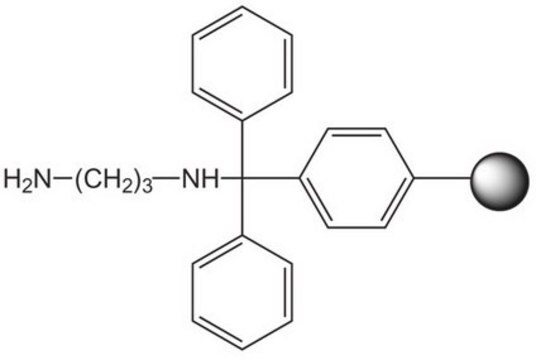Recommended Products
biological source
rabbit
Quality Level
antibody form
purified antibody
antibody product type
primary antibodies
clone
polyclonal
form
liquid
contains
≤0.1% sodium azide as preservative
species reactivity
human, mouse
manufacturer/tradename
Calbiochem®
storage condition
do not freeze
isotype
IgG
shipped in
wet ice
storage temp.
2-8°C
target post-translational modification
unmodified
Gene Information
human ... MLH1(4292)
General description
Purified rabbit polyclonal antibody. Recognizes the ~83 kDa MLH1 protein.
Recognizes the ~83 kDa MLH1 protein.
This Anti-MLH1 (Ab-2) Rabbit pAb is validated for use in Immunoblotting for the detection of MLH1 (Ab-2).
Immunogen
Human
recombinant human MLH1
Application
Immunoblotting (1 µg/ml)
Packaging
Please refer to vial label for lot-specific concentration.
Warning
Toxicity: Standard Handling (A)
Physical form
In 0.05 M sodium phosphate buffer, 0.2% gelatin.
Analysis Note
Negative Control
HCT116 cells
HCT116 cells
Positive Control
LoVo cells
LoVo cells
Other Notes
Antibody should be titrated for optimal results in individual systems.
Bronner, C.E., et al. 1994. Nature368, 258.
Papadopoulos, N., et al. 1994. Science263, 1625.
Peltomäki, P.T. 1994. Ann. Med.26, 215.
Fishel, R., et al. 1993. Cell75, 1027.
Leach, F.S., et al. 1993. Cell75, 1215.
Lindbolm, A., et al. 1993. Nat. Genet.5, 279.
Papadopoulos, N., et al. 1994. Science263, 1625.
Peltomäki, P.T. 1994. Ann. Med.26, 215.
Fishel, R., et al. 1993. Cell75, 1027.
Leach, F.S., et al. 1993. Cell75, 1215.
Lindbolm, A., et al. 1993. Nat. Genet.5, 279.
Legal Information
CALBIOCHEM is a registered trademark of Merck KGaA, Darmstadt, Germany
Not finding the right product?
Try our Product Selector Tool.
Storage Class Code
10 - Combustible liquids
WGK
nwg
Certificates of Analysis (COA)
Search for Certificates of Analysis (COA) by entering the products Lot/Batch Number. Lot and Batch Numbers can be found on a product’s label following the words ‘Lot’ or ‘Batch’.
Already Own This Product?
Find documentation for the products that you have recently purchased in the Document Library.
Tegan S Horan et al.
PLoS genetics, 13(7), e1006885-e1006885 (2017-07-21)
The hypothesis that developmental estrogenic exposure induces a constellation of male reproductive tract abnormalities is supported by experimental and human evidence. Experimental data also suggest that some induced effects persist in descendants of exposed males. These multi- and transgenerational effects
Lisa A Vrooman et al.
Genetics, 196(2), 385-396 (2013-12-10)
Increasing age in a woman is a well-documented risk factor for meiotic errors, but the effect of paternal age is less clear. Although it is generally agreed that spermatogenesis declines with age, the mechanisms that account for this remain unclear.
Martha Susiarjo et al.
Methods in molecular biology (Clifton, N.J.), 558, 339-354 (2009-08-18)
The goal of this chapter is twofold: First, to acquaint the reader with the problems inherent in analyzing mammalian female meiosis and, second, to provide a step-by-step approach to mastering the necessary techniques. Although the methods presented are for use
Polash Chandra Karmakar et al.
Scientific reports, 7(1), 11858-11858 (2017-09-21)
The endocrine disruptor bisphenol A (BPA) is well known for its adverse effect on male fertility. Growing evidence suggests that BPA may interact with testicular germ cells and cause infertility as a result of its estrogenic activity. Objective of current
Maithili Gupte et al.
PloS one, 8(9), e74071-e74071 (2013-09-11)
The major dilemma of cancer chemotherapy has always been a double-edged sword, producing resistance in tumor cells and life-threatening destruction of nontumorigenic tissue. Glioblastoma is the most common form of primary brain tumor, with median survival at 14 months after
Our team of scientists has experience in all areas of research including Life Science, Material Science, Chemical Synthesis, Chromatography, Analytical and many others.
Contact Technical Service








